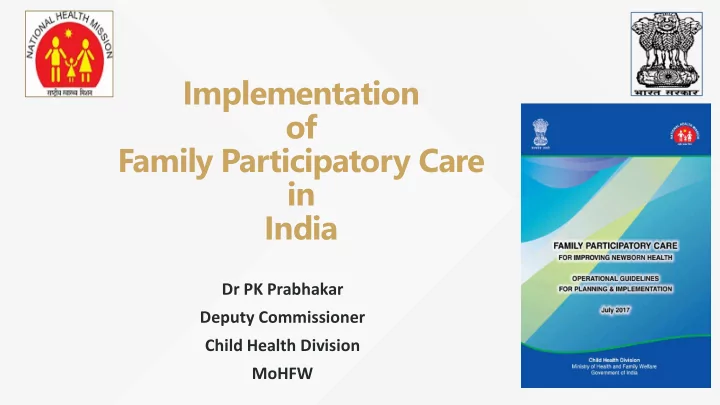

Implementation of Family Participatory Care in India Dr PK Prabhakar Deputy Commissioner Child Health Division MoHFW
India Newborn Action Plan (INAP) 2014 S e I s X I n t e r Care during Immediate Care of Care of Care v Preconception e labour & newborn healthy small & sick beyond & Antenatal n Care childbirth care newborn newborn survival t i o n P a 1. Annual birth cohort is 25 million c 2. Recommitted continuum of care across life cycle and facility to home for newborn under INAP – also first country to add interventions for care beyond survival k 3. During 1990-2016 , Decline in NMR in India was 55% whereas global decline was 41% a g
India’s gains in newborn health (2000-2015) India has highest number of preterm Neonatal mortality rates in India, 2000-2015 births & deaths in the world (WHO report 2012) . Neonatal deaths per 1000 live births 16 11.9 14.3 12.5 During 2000-2015: 14 14.3 12.3 9 6.5 12 8.1 10 3.9 • Neonatal infection fell by 66% 5.7 8 2.2 • Birth asphyxia or trauma fell by 76% 4 6 • T etanus fell by >90% 4 • Prematurity/low birth weight rose 2 modestly (mostly term LBW babies) 0 `2000 `2005 `2010 `2015 Prematurity/lowbirthweight Neonatal infections Birth asphyxia/trauma
Facility Based New Born Care Home Based New Born Care Special New born Care Units (800 functional ) at District Hospital/ Nearly 1 million accredited social health Medical College activists (ASHA) in position More than 10 million new-borns received home visits in 2017-18 Around 240,000 sick newborns referred Essential Newborn Care at all delivery points Entitlements : free treatment & referral transport, drugs, diagnostics & diet for mother, newborn & infants through JSSK
Quality issues emerging from newborn care units 10% of newborns followed up after discharge from newborn care units did not survive till one year of life; lack of continuity of care at home was one of the many reasons In 2017-18: 41% of total admissions in newborn care units are in the category of 1500- 2499gm and 36% are preterm (34-37 weeks gestation) requiring continued care like KMC, breast feeding support, developmentally supported care and infection prevention. High case load units often deal with double burden of overcrowding and inadequate resources Compromised quality engagement with parents further affects the quality of care imparted in these units especially adherence to standard protocols and interventions like KMC or post discharge counselling.
Evolution of FCC Child Health division, MoHFW proposed piloting of FCC experience at RML under NIPI Newborn Project as an innovation By NIPI-New-born RML- Phase 1 Project in PGIMER Developed and scaled up in parternship with Countr under disseminated 3 states Upscale state governments guidance of y wide National (MP , Idea Pilot in 5 DH- Raisen, in NIPI Dr Arti Maria Operational Rajasthan scale Hoshnagabad, showed FCC guideline and states and Odisha) Alwar, Nalanda, up is relevant in training package and now Jharsuguda is Indian for FPC across the feasible in public context country health settings 2014 2015 2017 2016
Theory of Change Problem/Premise Strategies Outcome Goal Develop Operational 1. Mortality amongst Guidelines and Training sick & small new Mothers / Package on Family Centred born discharged Families Care from SNCUs actively involved in Reduced Establishing models of family the care of neonatal 2. Need for continued sick & small mortality centered care at identified care of low birth new born at sick new born units facility and and pre-term babies home Developing skills of mothers / families for providing 3. lack of continuity of optimal care to sick & small care at home new born
Provisions in Operational guideline Adapted Family Participatory Care as an integral part of Facility Based Newborn Care at Level-II care units at the district level in public Health System Name changed from Family Centered Care to Family Participatory Care Operational Guideline for FPC elaborating on key steps for implementation FPC will be restricted to: • those newborn who weigh more than 1500gm • newborn who are not on IV fluids, oxygen and • only willing parents will be trained. • Prioritization of high caseload facilities done • Resources made available under NHM for Budget proposals from the states Capacity building tools adapted from existing module developed by NIPI, consisting of an Audio -Visual module (which is structured into 4 sequential sessions) of about an hour and a training guide. Monitoring and Evaluation frame work integrated with the existing FBNC system Links to be provided in the final version
Way Forward 1. The states submit budget proposals in the annual plans based on gap assessment 2. National Quality Assurance System of India has include provision of FPC in the checklist for accreditation of units 3. Indian Public Health Standards (IPHS-2012) under revision will also include the provisions for establishing MNCU 4. Integrating FPC in existing FBNC a) Operational guideline of FBNC which is currently under revision will include FPC b) Provisions for FPC for establishing Mother Newborn care Unit (MNCU) at high case load facilities are ensured c) State Resource Centres for Facility Based Newborn Care will provide integrated supportive supervision 5 Experience sharing with neighboring countries
Family Participatory Care -Scale Up in India Proposed scale up to nearly 800 104 SNCUs across special India newborn care units 5 NIPI Model Units One Tertiary Unit
THANKS
Recommend
More recommend